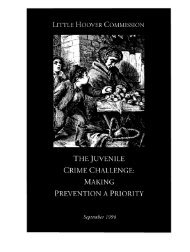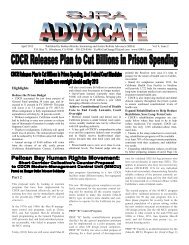Jailhouse Lawyer's Handbook - Sentencing and Justice Reform ...
Jailhouse Lawyer's Handbook - Sentencing and Justice Reform ...
Jailhouse Lawyer's Handbook - Sentencing and Justice Reform ...
Create successful ePaper yourself
Turn your PDF publications into a flip-book with our unique Google optimized e-Paper software.
dismissed or the court grants summary judgment in<br />
favor of the defendants.<br />
1. Motion to Alter of Amend the Judgment<br />
Your first option is to file a Motion to Alter or Amend<br />
the Judgment under Federal Rules of Civil Procedure<br />
Rule 59(e). This motion must be filed within ten days<br />
after entry of judgment, so you will have to move<br />
quickly. Follow the form in Appendix B. Include a<br />
legal memor<strong>and</strong>um that cites the cases from your<br />
circuit.<br />
Follow the same procedure if the court dismisses your<br />
complaint without giving you an opportunity to amend<br />
it to “overcome the deficiency.” Also follow this<br />
procedure if the court grants a summary judgment to<br />
the defendants before you had enough time to submit<br />
your declarations. Cite the cases discussed in Section D<br />
of this chapter <strong>and</strong> submit any declarations you have<br />
been able to get since you were notified of the<br />
summary judgment.<br />
2. How to Appeal the Decision of the District Court<br />
If you lose your motion to alter the judgment, you can<br />
appeal to the U.S. Court of Appeals for your district.<br />
You begin your appeal by filing a Notice of Appeal<br />
with the clerk of the district court whose decision you<br />
want to appeal. Follow the form in Appendix B. If you<br />
moved to alter under Rule 59(e), file your notice within<br />
30 days after the court denied your motion. Otherwise<br />
file your notice within 30 days of the day the order or<br />
judgment was entered by the district court.<br />
The appeals process is governed by the Federal Rules<br />
of Appellate Procedure. These rules are supposed to be<br />
in your prison library as part of Title 28 of the United<br />
States Code Annotated (U.S.C.A). The U.S.C.A. also<br />
gives summaries of important court decisions which<br />
interpret the Federal Rules of Appellate Procedure.<br />
(Chapter Six explains how to use the U.S.C.A. <strong>and</strong><br />
other law books.) Some of the books listed in Appendix<br />
E give more information on the appeals process.<br />
If you sued in forma pauperis, you can appeal in forma<br />
pauperis, unless the district court finds that your appeal<br />
is not taken “in good faith.” If the district court decides<br />
this, you have to send to the Appeals Court in forma<br />
pauperis papers like those you sent to the district court,<br />
except that you should explain the basis of your appeal.<br />
Submit these papers within 30 days after you are<br />
notified that the district court ruled that your appeal<br />
was not in good faith.<br />
Soon after you receive a notice that your appeal has<br />
been transferred to the Court of Appeals, submit<br />
another Motion for Appointment of Counsel. Use the<br />
form in Chapter 3, Section C for requesting counsel<br />
from the district court, but change the name of the court<br />
<strong>and</strong> state the basis of your appeal. If you have to submit<br />
new in forma pauperis papers, send them together with<br />
the motion for counsel.<br />
Along with your Motion for Appointment of Counsel,<br />
submit a Memor<strong>and</strong>um of Law which presents all your<br />
arguments for why the appeals court should reverse the<br />
decision of the district court. If the appeals court thinks<br />
your appeal has merit, it usually will appoint a lawyer<br />
for you. Otherwise you may get a summary dismissal<br />
of your appeal.<br />
G. PRE-TRIAL DISCOVERY<br />
On the other h<strong>and</strong>, if you have made it past the<br />
defendant’s motions for dismissal <strong>and</strong> / or summary<br />
judgment, then there is a better chance that the court<br />
will appoint an attorney to assist you. If so, you can use<br />
this section of the <strong>H<strong>and</strong>book</strong> to underst<strong>and</strong> what your<br />
lawyer is doing, to help him or her do it better <strong>and</strong> to<br />
figure out what you want him or her to do. If you do<br />
not have a lawyer, this section will help you get<br />
through the next stage on your own – but what you will<br />
be able to do will be more limited.<br />
The next major<br />
activity in your suit<br />
will be “pre-trial<br />
discovery.” Rules 26-<br />
37 of the Federal<br />
Rules of Civil<br />
Procedure explain<br />
“discovery” tools that<br />
either party in a<br />
lawsuit can use to get<br />
important information<br />
<strong>and</strong> materials from the<br />
other party before the<br />
case goes to trial.<br />
Discovery is very<br />
important, because it<br />
is a way for you to get<br />
the information you<br />
will need to win your<br />
case. If you don’t have<br />
a lawyer at this stage,<br />
you will need to spend<br />
The Importance of<br />
“Discovery”<br />
• Uncover factual<br />
information about the<br />
events that gave rise to<br />
your case.<br />
• Learn about how<br />
prisons in general, <strong>and</strong><br />
your prison in particular,<br />
operate, as long as it is<br />
somehow related to your<br />
case.<br />
• Put the defendants on<br />
the defensive by making<br />
them spend time <strong>and</strong><br />
money answering your<br />
questions.<br />
a lot of time thinking about what facts you will need to<br />
prove at trial, <strong>and</strong> coming up with a plan about how to<br />
find out that information. The Southern Poverty Law<br />
JAILHOUSE LAWYERS HANDBOOK – CHAPTER FOUR<br />
57





